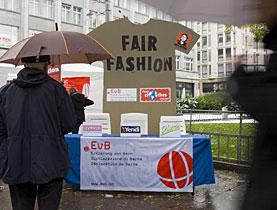 Just SFr0.10 ($0.09) of the cost of a T-shirt can make the difference between a life of dignity and one of poverty for the seamstress.
Just SFr0.10 ($0.09) of the cost of a T-shirt can make the difference between a life of dignity and one of poverty for the seamstress.
The calculation comes from the Swiss non-governmental organisation, the Berne Declaration, which has done a survey of ethical standards among Swiss clothing firms.
The NGO supports the international Clean Clothes Campaign (CCC), which calls for textile workers' rights such as health and safety, a living wage, job security and reasonable working hours.
As part of its commitment to the campaign, the Berne Declaration evaluated 23 Swiss fashion companies and has just released its findings.
"As a consumer, it's quite difficult to get the information," said Christa Luginbühl of the Berne Declaration.
To make it easier, Luginbühl and her team have prepared a website, a pocket guide and a 68-page magazine sharing months' worth of research performed by the NGO. A new English-language website shows how the Swiss companies compare with their European peers.
Of the Swiss companies investigated, only two were praised as leaders in their efforts to produce garments ethically.
Twelve were declared average and another nine were labelled as ignorant. Each company was rated on the following criteria: transparency, code of conduct (both content and application of), monitoring/verification and the availability of organic and fair trade products.
The good, the average and the ignorantWith a score of "good" in every category, Switcher was the frontrunner. Founded in 1981 by Robin Cornelius, Switcher is known for its colourful array of T-shirts, sweatshirts, fleece jackets and other casual apparel.
It's also known for its commitment to the people producing the textiles. The company motto — "made with respect" — actively encourages consumers to think about how their clothing is made.
"We're very proud of our evaluation in the report," said Switcher's Christelle Huwiler.
However, there is always room for improvement. According to Huwiler, Switcher plans to reduce its CO2 emissions and increase its selection of organic cotton products in 2009.
Coop's organic "Naturaline" clothing, made primarily by Remei, also earned good marks from the Berne Declaration. Naturaline represents 26 per cent of Coop's cotton textiles – an impressive figure, considering that less than one per cent of the world's cotton is organic. In addition, the entire Naturaline collection should be CO2-neutral by 2012 according to one Switzerland's leading retailers.
At the lower end of the spectrum, Schild landed in the "ignorant" category of the report – partly because the clothing retailer didn't complete the questionnaire or reply to initial enquiries from the NGO. However, Schild later expressed its interest in ethical fashion.
"We haves recently joined the Business Social Compliance Initiative (BSCI), which guarantees that suppliers are monitored in the areas of social compliance and ethics by independent, certified testing companies," Maja Amrein of Schild told swissinfo.
Alternative labelsWith 33 shops throughout Switzerland, the company carries numerous men's and women's fashion labels. Amrein added that thanks to Schild's new partnership with the BSCI, the retailer would be able to meet the highest international requirements.
However, the NGO is sceptical about the social compliance standards and recommends membership in the Fair Wear Foundation (FWF) instead.
"Although joining BSCI is a meaningful first step, it alone is not a sufficient instrument for solving the central problems of the workers in the textile chain. For the BSCI, maintaining the company's reputation is at the forefront, " said Luginbühl.
Mammut Sports Group and Odlo International decided to join the FWF after being evaluated and categorised as "average" by the Berne Declaration. Both companies specialise in outdoor clothing.
"We have nothing to hide, so we wanted to work with the FWF to offer more transparency," said Adrian Huber, Mammut's head of corporate social responsibility.
Huber said it was also an opportunity to inspire others by setting a good example. As a new member of the FWF, Mammut must prepare a detailed plan of action to ensure that a strict code of conduct is followed. The company will also be required to keep the public informed of its progress.
"However, we're not so naïve as to think that we're all set now that we're in the FWF. There's a lot of work to be done," said Huber.
Lifestyles of health and sustainability are in vogue, which means the demand is high for fairly produced and environmentally friendly products.
Yet organisations supporting the CCC are generally reluctant to provide lists of "clean" retailers and manufactures.
"Things are not really at the point yet where we would feel comfortable endorsing or recommending any companies since they all have a long way to go," says the Fashion Check website.





